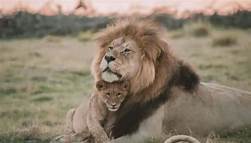Can You Have a Lion as a Pet?
Lions are magnificent creatures, but are they suitable to be kept as pets? This article delves into the complexities of lion ownership, exploring the legal, ethical, and practical considerations associated with keeping a lion as a pet. We'll examine the challenges and risks involved and provide insights into why lions are not ideal companions for the average household.

Legal and Ethical Considerations
Legality: In most countries, it is illegal to own a lion as a pet. Lions are classified as wild animals, and keeping them in captivity is subject to strict regulations. Permits and licenses are typically required, and these vary depending on the jurisdiction.
Ethics: Lions are apex predators with specific needs and instincts. Keeping them in a domestic environment deprives them of their natural habitat and social interactions. Lions require vast spaces to roam, hunt, and socialize with their pride, which is difficult to replicate in captivity.
Practical Challenges
Space Requirements: Lions need ample space to exercise, play, and roam freely. They benötigen a large enclosure that allows them to engage in natural behaviors. Providing such an environment in a residential setting is impractical and often inhumane.
Nutrition: Lions have a specialized diet consisting primarily of meat. Their nutritional needs are complex, and providing a balanced and adequate diet can be challenging for non-professionals. Improper nutrition can lead to health problems and behavioral issues.
Safety Concerns: Lions are powerful predators with the potential to cause serious injury or death. Even if properly trained, lions remain unpredictable animals. Accidents can happen, especially when handling or interacting with them.
Behavioral Considerations
Instinctive Behaviors: Lions are wild animals with innate instincts to hunt, chase, and defend their territory. These behaviors can pose a danger to humans, particularly when the lion feels threatened or stressed.
Social Needs: Lions are social animals that live in prides, where they establish complex social hierarchies and engage in cooperative behaviors. Isolating a lion from its natural social group can lead to psychological distress and behavioral problems.
Training and Handling: Training a lion is a specialized skill that requires expertise, experience, and adequate facilities. Improper training techniques can exacerbate behavioral problems and increase the risk of accidents.
In conclusion, while lions are fascinating and majestic creatures, they are not suitable to be kept as pets. The legal, ethical, practical, and behavioral challenges associated with lion ownership outweigh any perceived benefits. Lions belong in their natural habitats, where they can thrive and fulfill their ecological roles. Keeping a lion as a pet is a disservice to the animal and a potential danger to humans. Rather than attempting to domesticate these wild predators, we should focus on protecting and preserving their natural habitats and appreciate them from a distance.
Declaration: All article resources on this website, unless otherwise specified or labeled, are collected from online resources. If the content on this website infringes on the legitimate rights and interests of the original author, you can contact this website to delete it.





